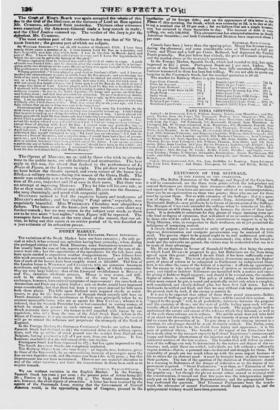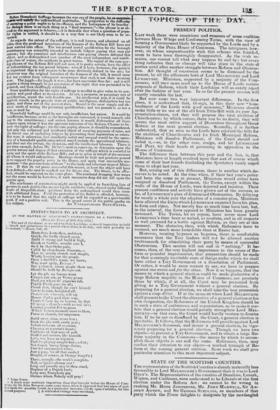EXTENSION OF THE SUFFRAGE.
TO THE EDITOR. Or THE SPECTATOR.
SIR—The Ballot, Extension of the Suffrage, and Repeal of the Corn-laws, it will he remembered, are the three main points which the independent and onward Reformers are directing their strenuous efforts to carry. The Ballot and repeal of the Corn-laws are measures that admit of no misinterpretation; there can be no equivocation on these two points ; those who are not for them must be against them. Not so with extension of the Suffrage: that is a ques- tion :of degree. Men of any political creed—Tory, Aristocratic Whig, and Democratic Radical—may profess to be in favour of an extension of the Suffrage. The Marquis of CH A NOOS extended the suffrage when lie introduced his fifty• pound tenant-at-will clause, which made the farmers the slaves of their land. lords. It is desirable to substitute for this phrase of vague meaning some spe- cific kind or degree of extension, that will admit of no misunderstanding either by those who will he called upon by their constituents to support it, or by the Whig Ministry, who, in compaasion to their weakness, are as yet permitted the indulgence of remaining neutral.
A clearly defined aim is essential to unity of purpose; without it, the most
vigorous determination and energetic perseverance may be rendered of little avail. The precise object to be gained ought to be well understood and COM. pletely agreed upou before the attack is commenced; else, when the breach is made and the outworks are gained, the victors may be malecided what use is to be made of their advantage. Mr. HUME declares in favour of Household Suffrage, that being the extent to which Lord DURHAM" proposed to get ; but Reformers are far from being agiced upon this point : indeed I do not think it has been sufficiently consi- dered by Mr. Hu ME. The want of preliminary discussions amoug the Radical party of plans of reform to be submitted to Parliament by independent Mem- bers, is too often the cause of the failure of a motion: it affords an opportunity for the enemy to take advantage of division of opinion or irresolution of put • pose ; and timid or indolent Reformers are furnished with a motive and excuse for giving it feeble or frigid support; and should it be carried even, the smallest degree of reform is conceded. The policy of taking reforms by instalinents when more cannot be got, is sound and practically useful only when a complete, welbconsidered, and elearly-defined plan has been first laid &WED. Let the landmarks be settled and fixed, and then we may without risk take possession of the ground, inch by inch, if the enemy so contest it.
It is not to be expected that either of these three grand measures—Ballot,
Extension of Suffrage, or repeal of Corn laws—will be carried this session. An " appeal to the people" will, in all prohability, intervene between the proposal and the carrying of them ; and the state of public feeling upon each will ma- terially affect, if not altogether determine the result. The people ought well to understand the nature and extent of the reforms which they' demand, as well as of the evils these refitting are to redress. The public mind does not take hold of an object not thoroughly detivea, with that tenacity of grasp which is essen- tial to secure the possession of it. To give them a lively stirring interest in a question, its advantages should be made distinctly evident. 'lice Ballot, every voter knows and feels to be his shield from injury and oppression : it ia the wgis of political liberty.. The benefits a the repeal of the Corn-laws have been made clear to the meanest capacity. by Colouel T/1031PSON'S numerous and happy and familiar illustrations of the injustice and folly of the laws, and the harvested motives of the law•makers. The benefits that will follow an exten- sion of the suffrage can only be determined by the nature and degree of the ex-
tension; and, until these are settled, individuals are left without a sufficiently urgent motive—that is, a personal one—to demand and struggle for them. The generality of people are too much taken up with the more urgent business of life to strive for an abstract good : it must be brought home to their bosoms or their pockets. The fate of the question of the duratiuu of Parliaments should
be a warning to Reformers of the danger of indecision to the degree of im- provement required. "Short Parliaments " was then, as " Extension of Suf- frage" is now, echoed in all the addresses of Liberal candidates responsive to the popular cry : but though the phrase meant either annual or triennial with the constituencies, it turned out that five years was the interptetation ingeni- ously put on it by some slippery Representatives ; and the qurnquennial hum- bug cushioned the question. flail Triennial Parliaments been the watch- word, the advocates of annual Parliaments would have adopted it, and the
quinquennial trickery would have been prevented.
Before Household Suffrage becomes the war-cry of the potties-14.0 asuctaist. thperwittsteettfrtheinairanchlsefi multitudes. In proportion to the difficuley carrying a point ought to be its efficacy, and the lastingness of its benefits: for though there is no such thing as a "final measure "—the phrase is u ab• sesdas the argument is delusive,—it is desirable that ;hen a question of popu- lar rights is settled, it should be in a way that is not likely noon to be re. Opellea•
AS regards the extent of the suffrage, it is well known, and admitted on all sides, that the professed intentions of the framers of the Reform Bill have not been carried into effect. The ten-pound rental qualification for the borough constituency was ostensibly intended to include lodgers paying that sum per annum; but the vexatious and mischievous rate paying clauses defeated this object, and so disfranchised vast number- of the most independent and intelli- gent class of voters, the residents in great towns. The repeal of the rate-pay- ing clauses of the Reform Bill will not now, it is pretty certain, have the effect of enfranchising the ten.pound lodgers : es-en if it have, however, the point is es important that it will require to be more distinctly defined in the act ; for whatever was the original intention of the framers of the bill, it would seem but too evident from subsequent occurrences that such is not their meaning LOW. The juggle—for juggle it was—has been successful thus far : and it will require a sharp struggle to get possession of the right that was pretended to be granted, and then sbuffiingly withheld.
Some qualification for the right of suffrage is needful to give value to its pos- session and good effect to its exercise. As yet, a property, or pecuniary test of qualification seem a the only feasible one. An intellectual test, if it could be applied, would, in the present state of public intelligence, disfranchise but too many, and those not of the poorest class. Rental is the most simple and ob- vious mode of testing the pecuniary qualification; and ten pounds is as low a sum as need be.
Household Suffrage would be not only insufficient, but unjust. It would be insufficient, because, so far as the boroughs are concerned, it would scarcely add any to the constituency ; and unjust, because it would disfranchise all those lodgers upon whom it was the apparent intention of the Reform Charter to be. stow the right of suffrage : for the rate-paying clauses, it should be remembered, bad only the collateral and incidental object of securing payment of rates, not the direct one of excluding lodgers by preventing their registration as voters. But were it otherwise, how manifestly unfair and unequal wetild be the opera- tion of a household qualification which would include the agricultural labourer, and shut out the artisan, the shopman, and the intellectual labourer. There is yet time enough, before Mr. II usi moti3n comes on, to determine upon the precise nature and degree of that extension of the suffrage which is essential to carry out the spirit of the Reform Bill ; and so to inlist in behalf of the measure all whom it would enfranchise. Meetings should be held and petitions poured in to support the popular party in the House, and apply that irresistible mo. tient= • the presume from without" to the tardy and reluctant steps of Minis- ters. If this do not prove successful this season, at least the object will have been defined—the spot be marked out for future aim. The blows, to be effec- tual, should be repeated on the same place. The continual dropping that wears out the stone would be harmless, if each successive drop did not fall upon the precise spot. The machinery of registration might easily be applied to furnishing lists of persons in each parish who ore not legally entitled to vote, classed under different beads of disqualification : petitions from the unfranchised would then come with additional force. Until the protection of the Ballot is afforded, however, it is to be feared that the right of suffrage will be regarded as a questionable good, if not a positive evil. This is the grand secret of the public apathy on



























 Previous page
Previous page